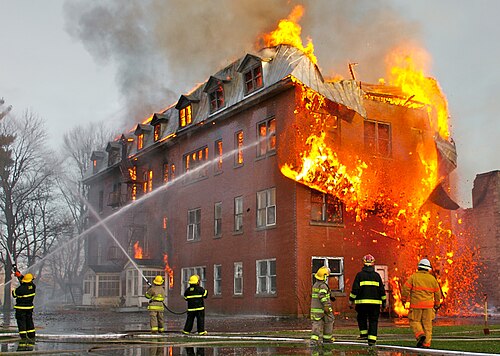Buildingnoun
(uncountable) The act or process by which something is built; construction.
Buildingnoun
(countable) A closed structure with walls and a roof.
Buildingverb
present participle of build
Buildingnoun
The act of constructing, erecting, or establishing.
Buildingnoun
The art of constructing edifices, or the practice of civil architecture.
Buildingnoun
That which is built; a fabric or edifice constructed, as a house, a church, etc.
Buildingnoun
a structure that has a roof and walls and stands more or less permanently in one place;
Buildingnoun
the act of constructing or building something;
Buildingnoun
the commercial activity involved in constructing buildings;
Buildingnoun
the occupants of a building;
Buildingnoun
a structure with a roof and walls, such as a house or factory.
Buildingnoun
the action or trade of constructing something
Buildingnoun
the creation or development of something over a period of time
Buildingnoun
a flock of rooks
Building
A building, or edifice, is a structure with a roof and walls standing more or less permanently in one place, such as a house or factory. Buildings come in a variety of sizes, shapes, and functions, and have been adapted throughout history for a wide number of factors, from building materials available, to weather conditions, land prices, ground conditions, specific uses, and aesthetic reasons.
Premisenoun
A proposition antecedently supposed or proved; something previously stated or assumed as the basis of further argument; a condition; a supposition.
Premisenoun
(logic) Any of the first propositions of a syllogism, from which the conclusion is deduced.
Premisenoun
Matters previously stated or set forth; especially, that part in the beginning of a deed, the office of which is to express the grantor and grantee, and the land or thing granted or conveyed, and all that precedes the habendum; the thing demised or granted.
Premisenoun
A piece of real estate; a building and its adjuncts. (This meaning arose from meaning #3, by owners of land and/or buildings finding the word in their title deeds and wrongly guessing its meaning.)
Premisenoun
(authorship) The fundamental concept that drives the plot of a film or other story.
Premiseverb
To state or assume something as a proposition to an argument.
Premiseverb
To make a premise.
Premiseverb
To set forth beforehand, or as introductory to the main subject; to offer previously, as something to explain or aid in understanding what follows.
Premiseverb
To send before the time, or beforehand; hence, to cause to be before something else; to employ previously.
Premisenoun
A proposition antecedently supposed or proved; something previously stated or assumed as the basis of further argument; a condition; a supposition.
Premisenoun
Either of the first two propositions of a syllogism, from which the conclusion is drawn.
Premisenoun
Matters previously stated or set forth; esp., that part in the beginning of a deed, the office of which is to express the grantor and grantee, and the land or thing granted or conveyed, and all that precedes the habendum; the thing demised or granted.
Premisenoun
A piece of real estate; a building and its adjuncts; as, to lease premises; to trespass on another's premises.
Premiseverb
To send before the time, or beforehand; hence, to cause to be before something else; to employ previously.
Premiseverb
To set forth beforehand, or as introductory to the main subject; to offer previously, as something to explain or aid in understanding what follows; especially, to lay down premises or first propositions, on which rest the subsequent reasonings.
Premiseverb
To make a premise; to set forth something as a premise.
Premisenoun
a statement that is assumed to be true and from which a conclusion can be drawn;
Premiseverb
set forth beforehand, often as an explanation;
Premiseverb
furnish with a preface or introduction;
Premiseverb
take something as preexisting and given
Premise
A premise or premiss is a statement that an argument claims will induce or justify a conclusion. It is an assumption that something is true.















